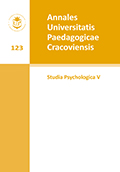Chinese families’ adaptation to childhood deafness: implications for psychoeducational support for families with deaf children in China
Chinese families’ adaptation to childhood deafness: implications for psychoeducational support for families with deaf children in China
Author(s): Miloň Potměšil, Liu ShenglinSubject(s): Psychology
Published by: Wydawnictwo Uniwersytetu Komisji Edukacji Narodowej w Krakowie
Summary/Abstract: Childhood deafness not only impacts children’s development, but also affects all aspects of family life. This study used a sample of 107 families with deaf children from China to examine how Chinese families adapted to the stress of having a deaf child in the family. A questionnaire was developed to assess the impact of childhood deafness on family life, the family’s perception of childhood deafness, the family’s resources, and the overall outcome of adaptation. The results showed that childhood deafness, as a stressor, impacted Chinese family life considerably, leading to a series of parenting difficulties, such as additional financial burdens, difficulty in communicating with the child, and so on. However, in general, the surveyed Chinese families adapted to childhood deafness positively despite experiencing strong and long-term grief. The positive adaptation could probably be contributed to Chinese families’ collective resources, such as family cohesion and open communication. Finally, implications for psychoeducational support for families with deaf children in China are discussed.
Journal: Annales Universitatis Paedagogicae Cracoviensis. Studia Psychologica
- Issue Year: IV/2011
- Issue No: 1
- Page Range: 34-48
- Page Count: 15
- Language: English

